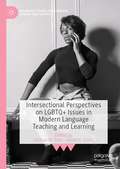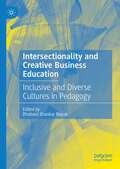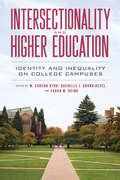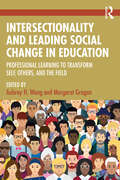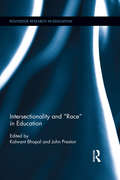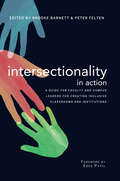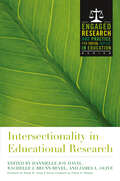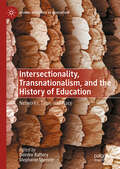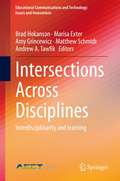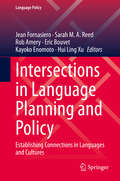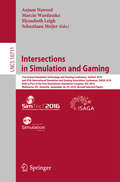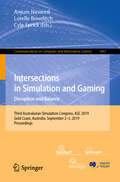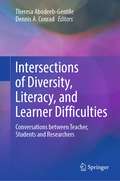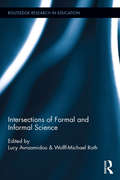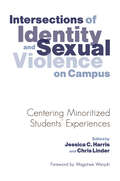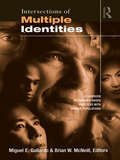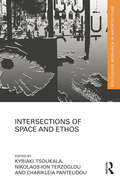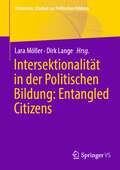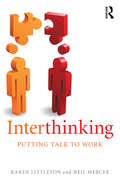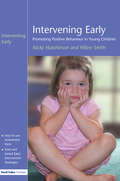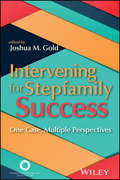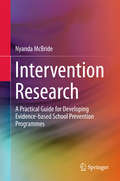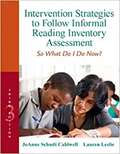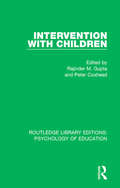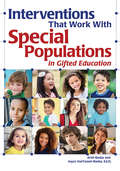- Table View
- List View
Intersectional Perspectives on LGBTQ+ Issues in Modern Language Teaching and Learning (Palgrave Studies in Language, Gender and Sexuality)
by Joshua M. Paiz James E. CodaThis edited book examines how sexuality and sexual identity intersect and interact with other identities and subjectivities – including but not limited to race, religion, gender, social class, ableness, and immigrant or refugee status – to form reinforcing webs of privilege and oppression that can have significant implications for language teaching and learning processes. The authors explore how these intersections may influence the teaching of different languages and how pedagogies can be devised to increase equitable access to language learning spaces. They seek to open the conversation on intersectional issues as they relate to sexuality and language teaching and learning, and provide a conversational space where readers can engage with the notion of intersectionality. This book will be of interest to students and scholars of applied linguistics and language education, gender and LGBTQ+ studies, and sociolinguistics, outlining possible future directions for intersectional research.
Intersectionality and Creative Business Education: Inclusive and Diverse Cultures in Pedagogy
by Bhabani Shankar NayakCreative Business Education is emerging rapidly to address the needs of the creative industries including digital media, journalism, advertisement, music, marketing, films, fashion and sports business etc. Inclusive educational praxis, decolonial knowledge traditions and diverse curriculums are central to egalitarian economic development and human empowerment. As such, this edited volume explores how creative business education specifically can help to build a more diverse and inclusive environment for an increasingly diverse body of students and faculty. It discusses how students can be encouraged to succeed and excel, reflecting on the need for academic pedagogies to embrace greater inclusivity for diverse cultures. Advancing different theoretical trends within intersectionality and the limits of its praxis, contributors deal with different forms of inequalities based on class, gender, race, religion and belief, sexual orientation, and disabilities in teaching and learning. It is important to articulate and outline the critical lineages of intersectionality within creative business education and its progressive potentials for pedagogical transformation.
Intersectionality and Higher Education: Identity and Inequality on College Campuses
by Terry-Ann Jones Elizabeth M. Lee Sarah M. Ovink W. Carson Byrd Derrick R. Brooms Rachelle J. Brunn-Bevel Antron D Mahoney Marcela G. Cuellar R. Nicole Johnson-Ahorlu Deborah M. Warnock Kristen A. Clayton Victor E. Ray Tonya Maynard Denise Goerisch Bedelia N. Richards Melanie Jones Gast Ervin Maliq Matthew Orkideh Mohajeri Fernando Rodriguez Finn Schneider Ophelie Rowe-Allen Meredith Smith Tonisha B. Lane Annemarie Vaccaro Ezekiel Kimball Megan Nanney Susan V. IversonThough colleges and universities are arguably paying more attention to diversity and inclusion than ever before, to what extent do their efforts result in more socially just campuses? Intersectionality and Higher Education examines how race, ethnicity, class, gender, sexuality, sexual orientation, age, disability, nationality, and other identities connect to produce intersected campus experiences. Contributors look at both the individual and institutional perspectives on issues like campus climate, race, class, and gender disparities, LGBTQ student experiences, undergraduate versus graduate students, faculty and staff from varying socioeconomic backgrounds, students with disabilities, undocumented students, and the intersections of two or more of these topics. Taken together, this volume presents an evidence-backed vision of how the twenty-first century higher education landscape should evolve in order to meaningfully support all participants, reduce marginalization, and reach for equity and equality.
Intersectionality and Leading Social Change in Education: Professional Learning to Transform Self, Others, and the Field
by Margaret Grogan Aubrey H. WangThis book explores a social change and transformational approach to leadership. As educational leaders are increasingly serving a changing demographic of students and also address persistent challenges and heightened tension around race and equity, it is becoming necessary for educators to approach leadership in new and radical ways.Designed for aspiring and current leaders, this book highlights stories of courageous educational leaders with intersectional identities who interrogate and reflect on how their intersectionality shaped their leadership. In turn, these stories help readers explore how lived experiences and deeply held values can shape and inform their own leadership. Chapters conclude with a reader’s guide, prompting reflection upon the nuances of each leader’s journey, and thus, facilitating the discourse of marginalized experiences in educational leadership.This new approach to professional learning helps today’s aspiring principals, aspiring superintendents, and practicing administrators learn how intersectional leadership can help them navigate multiple marginalized spaces and codify new notions of power and success. This volume generates a collection of compelling counter narratives that the field needs to hear.
Intersectionality and Race in Education (Routledge Research in Education)
by Kalwant Bhopal and John PrestonEducation is a controversial subject in which difficult and contested discourses are the norm. Individuals in education experience multiple inequalities and have diverse identifications that cannot necessarily be captured by one theoretical perspective alone. This edited collection draws on empirical and theoretical research to examine the intersections of "race," gender and class, alongside other aspects of personhood, within education. Contributors from the fields of education and sociology seek to locate the dimensions of difference and identity within recent theoretical discourses such as Critical Race Theory, Judith Butler and ‘queer’ theory, post-structural approaches and multicultural models, as they analyze whiteness and the education experience of minority ethnic groups. By combining a mix of intellectually rigorous, accessible, and controversial chapters, this book presents a distinctive and engaging voice, one that seeks to broaden the understanding of education research beyond the confines of the education sphere into an arena of sociological and cultural discourse.
Intersectionality in Action: A Guide for Faculty and Campus Leaders for Creating Inclusive Classrooms and Institutions
by Peter Felten Brooke BarnettColleges and universities silo diversity and inclusion by creating specific courses to address them, or programs to welcome and support people with a range of identities, whereas in reality students, faculty and staff do not encounter diversity in the fractured ways that match the organizational structures of our institutions. We all simultaneously embody a variety of identities with different saliency in different circumstances and times.This book offers models for institutions to move intentionally toward intersections – of study abroad and multiculturalism, of race and gender and religion, and of other essential aspects of our educational programs and our students’ identities – to open doors to new possibilities that better prepare our students for life in a diverse world, and that allow our institutions to become more efficient and effective as we strive to not simply do things better in our own separate spheres, but to do better things by working together across difference.Each chapter offers action-oriented analysis focusing on particular campus intersections, rather than attending to specific demographic groups. Chapter authors also build on their own local expertise of doing this work on campuses that often do not have deep pockets or rich histories of such efforts.The book is organized into three sections:* People focuses on diversity broadly defined, considering questions about how we recruit and engage the students, faculty, and staff in the campus community, and how we work with governing boards and others to promote inclusive excellence.* Environment focuses on inclusion, including residence life, the local community, the working and learning environment, and external factors and events such as national and international news or town gown relationships.* Learning focuses on perspective taking and learning about difference in the core curriculum, the disciplines, and the co-curriculum, as well as professional development for faculty and staff.This ground reaking book helps readers, no matter what position they occupy on campus, to develop the knowledge and capacities necessary to create inclusive classrooms and is premised on the understanding that identity, oppression, power and marginalization cannot be addressed by looking solely at single identities.
Intersectionality in Educational Research
by Dannielle Joy Davis Rachelle J. Brunn-Bevel James L. OliveThe purpose of this work is to advance understanding of intersectional theory and its application to research in education. The scholars whose work appear in this volume utilize intersectional theory and research methods to work in fields and disciplines such as Education, Sociology, Women’s Studies, Africana Studies, Human Development, Higher Education Administration, Leadership Studies, and Justice Studies. The book illustrates how intersectional theory can be used in both quantitative and qualitative education research on college student access and success, faculty satisfaction and professional development, and K-12 educational issues such as high school dropouts and bullying. This book is unique, as no other book ties intersectionality to the research process.Key Features:* Readers will learn the basic tenets of intersectionality and how it can be useful in education research.* Readers will learn how intersectionality can be used to analyze both quantitative (large scale survey) and qualitative (interview, participant observation, and ethnographic) data.* Lastly, readers will learn how intersectionality can be particularly useful in examining the experiences of diverse groups of students attending elementary schools, high schools, colleges and universities, and faculty working at post-secondary institutions.Intersectionality is increasingly being used in research and education. This theory holds great promise in exploring students’ experiences in terms of access, success, and outcomes for marginalized groups. In essence, application of the theory promotes critical complex thinking regarding the intersectionality of race, class, and gender and their outcomes.
Intersectionality, Transnationalism, and the History of Education: Networks, Time, and Place (Global Histories of Education)
by Deirdre Raftery Stephanie SpencerThis volume brings together a diverse range of contributors to explore the significance of intersectionality and transnationalism, with reference to the history of education. The chapters cover a range of educational spaces and places and demonstrate the possibilities that theoretical approaches can offer to scholars at all levels of their academic career. The chapters focus specifically on women’s activism in order to maintain a coherent framework of research that is brought together in an introduction and concluding thoughts. The significance of gender as relational and a symbol of power ensures that men and masculinities are not overlooked but recognized as integral to understanding gender dynamics as they affected women’s education and the ways in which that education took place.
Intersections Across Disciplines: Interdisciplinarity and learning (Educational Communications and Technology: Issues and Innovations)
by Brad Hokanson Andrew A. Tawfik Amy Grincewicz Matthew Schmidt Marisa ExterThis volume is the result of the annual Summer research symposium sponsored by the Association for Educational Communications and Technology (AECT). The twenty-two chapters in this volume seek to examine how learning and the design of instruction is interdisciplinary and connective in terms of research and practice. The book is generally divided into three areas: Theory, Research, and Application. This framework shaped the authors’ interactions, discussions, and the informal context of the symposium. Writings are included on multiple levels including research and practice on learning across disciplines, including instructional design and how design thinking is inherently interdisciplinary. How learning is designed for general audiences or for purposely integrated educational experiences has also been examined.
Intersections in Language Planning and Policy: Establishing Connections in Languages and Cultures (Language Policy #23)
by Hui Ling Xu Jean Fornasiero Sarah M. A. Reed Rob Amery Eric Bouvet Kayoko EnomotoThis volume encompasses the range of issues encountered by language scholars who teach and research in departments of languages and cultures within the higher education system, predominantly in Australia, but touching other universities worldwide. Related studies on language planning, methodology or pedagogy have focused on one or more of these same issues, but rarely on their totality. Intersections as a metaphor running discreetly through the essays in this volume, connects them all to a lived reality. The field of languages and cultures, as it is practised and reflected upon in Australian universities, is essentially an interdisciplinary and interconnecting space - one in which linguistic and disciplinary diversities meet and join forces, rather than collide or disperse along different pathways. The international and local studies featured here focus on language planning, new pedagogies and language reclamation and link to meeting points and commonalities. They show that language scholars are increasingly finding themselves on common ground as they tackle issues of policy and practice affecting their field, whether within their institutions, within the tertiary system, or within the framework of government policy.
Intersections in Simulation and Gaming: 21st Annual Simulation Technology And Training Conference, Simtect 2016, And 47th International Simulation And Gaming Association Conference, Isaga 2016, Held As Part Of The First Australasian Simulation Congress, Asc 2016, Melbourne, Vic, Australia, September 26-29, 2016, Revised Selected Papers (Lecture Notes in Computer Science #10711)
by Anjum Naweed Marcin Wardaszko Elyssebeth Leigh Sebastiaan MeijerThis book constitutes the refereed post-conference proceedings of the 21st Annual Simulation Technology and Training Conference, SimTecT 2016, and the 47th International Simulation and Gaming Association Conference, ISAGA 2016, Held as Part of the First Australasian Simulation Congress, ASC 2016, held in Melbourne, VIC, Australia, in September 2016. The 28 revised full papers included in the volume were carefully reviewed and selected from 55 submissions. They are organized in the following topical sections: Making the grade; Come to think of it; From here to fidelity; The name of the game; and Ahead of the game.
Intersections in Simulation and Gaming: Third Australasian Simulation Congress, ASC 2019, Gold Coast, Australia, September 2–5, 2019, Proceedings (Communications in Computer and Information Science #1067)
by Anjum Naweed Lorelle Bowditch Cyle SprickThis book constitutes the refereed proceedings of the Australasian Simulation Congress, ASC 2019, held in Gold Coast, Australia in September 2019. The 10 papers presented were carefully reviewed and selected from 17 submissions. They provide a forum for sharing progresses in the areas of human dimensions; gaming experience; design and application; search and rescue; defence-oriented technology and training.
Intersections of Diversity, Literacy, and Learner Difficulties: Conversations between Teacher, Students and Researchers
by Dennis A. Conrad Theresa Abodeeb-GentileThis book invites readers to challenge, corroborate, and add to the discourse on more inclusive pedagogical practice. Presenting theoretically and empirically informed research, it highlights potential considerations regarding the intersections of diversity, literacy, and learner difficulties. These three areas provide a stage where opposing paradigms often pose challenges for educators and create unnecessary barriers to providing the best education for all learners. These barriers might reveal how students are positioned through a deficit lens rather than one that recognizes individual differences and how these learner differences sometimes result in labels or put students at increased risk of encountering difficulties. The contributing authors’ goals are to start and sustain a conversation that examines these perspectives and to offer counter-narratives to the deficit lens by recognizing that individual difference does not need to be a barrier to educational access. By examining opportunities for more inclusive educational success, this book encourages discourse among key stakeholders; further, it goes beyond problematizing to offer new avenues for optimal learning and inclusive pedagogy across multiple contexts.
Intersections of Formal and Informal Science (Routledge Research in Education #165)
by Wolff-Michael Roth Lucy AvraamidouScience learning that takes place between and at the intersections of formal and informal science environments has not been systematically reviewed to offer a comprehensive understanding of the existing knowledge base. Bringing together theory and research, this volume describes the various ways in which learning science in various settings has been conceptualized as well as empirical evidence to illustrate how science learning in these settings can be supported.
Intersections of Identity and Sexual Violence on Campus: Centering Minoritized Students' Experiences
by Chris Linder Jessica C. HarrisWhile sexual violence has been present and prevalent on campus for decades, the work of recent college student activists has made it an issue of major societal and institutional concern. This book makes an important contribution to and provides a foundation for better contextualizing and understanding sexual violence. Each chapter in this edited volume focuses on populations that are not often centered in the discourse of campus sexual violence and accounts for individuals' intersecting identities and how they interlock with larger systems of domination. Challenging dominant ideologies concerning assumptions of white women as the only victims-survivors, the racialization of aggressors, and the deleterious rape myths present in both research and practice, this book draws attention to the complexities of sexual violence on the college campus by highlighting populations that are frequently invisible in research, reporting, and practice. The book places sexual violence on campus in a historical context, centering the experiences of populations relegated to the margins, and highlighting the relationship between racism, classism, homophobia, transphobia, and other forms of domination to sexual violence. The final chapters of the book explore how critical models of intervention and prevention and a critical analysis of existing institutional policies may be implemented across college campuses to better address sexual violence for multiple populations and identities in higher education. This book will expand educators’ understanding of sexual violence to inform more effective policies, procedures, practice, and research that reaches beyond preventing sexual violence and addresses the dominant systems from which sexual violence stems, in an attempt to eradicate, not just prevent, the act and the issue.
Intersections of Multiple Identities: A Casebook of Evidence-Based Practices with Diverse Populations (Counseling and Psychotherapy)
by Editors Miguel E. Gallardo Brian W. McNeillOver the past two decades, there has been an increase in the need to prepare and train mental health personnel in working with diverse populations. In order to fully understand individuals from different cultures and ethnic backgrounds, practitioners need to begin to examine, conceptualize, and treat individuals according to the multiple ways in which they identify themselves. The purpose of this casebook is to bridge the gap between the current practice of counseling with the newest theories and research on working with diverse clientele. Each chapter is written by leading experts in the field of multicultural counseling and includes a case presentation with a detailed analysis of each session, a discussion of their theoretical orientation and how they have modified it to provide more culturally appropriate treatment, and an explanation of how their own dimensions of diversity and worldviews enhance or potentially impede treatment. This text is a significant contribution to the evolving area of multicultural counseling and will be a valuable resource to mental health practitioners working with diverse populations.
Intersections of Space and Ethos (Routledge Research in Architecture)
by Kyriaki Tsoukala Nikolaos-Ion Terzoglou Charikleia PantelidouThe pressing economic, environmental and social crises emanate the need for a redefinition of the dominant views, perspectives and values in the field of architecture. The intellectual production of the last two decades has witnessed an impressive number of new design techniques and conceptual displacements reflecting the dynamic and fluid relation between man and his dwelling space. However, the contemporary market forces are favouring the growth of a star-system in architectural production based on technological innovation, spectacular imagery and formal acrobatics, and are neglecting the social, environmental and moral implications of spatial design. Perhaps the time has come to think anew the possible critical intersections between space and ethos, not only as an answer to the negative consequences of Modernity, but also as a remedy to the negative aspects of globalisation. The aim of the present collective volume is to enliven the ethical dimensions and dilemmas of architecture as they are shaped within the complexity of our times on two levels: the level of critical and reflective discourse and the level of social and cultural reality occasioned by post-industrial modes of production and new technologies. Thirteen distinguished academics and researchers investigate the complex relations between architecture, space and ethics from divergent and inter-disciplinary perspectives: philosophy, sociology, the humanities, the arts, landscape design, environmental design, urban design and architectural history and theory.
Intersektionalität in der Politischen Bildung: Entangled Citizens (Citizenship. Studien zur Politischen Bildung)
by Dirk Lange Lara MöllerDieser Sammelband widmet sich dem Schwerpunktthema Intersektionalität und den damit verbundenen Impulsen, Anregungen und Schlussfolgerungen für die Politische Bildung. Der Begriff der Intersektionalität erlaubt es dabei, eine subjektbezogene und lebensnahe Perspektive zu berücksichtigen. Die Beiträge des Sammelbandes diskutieren, wie in einer subjektbezogenen Politischen Bildungsarbeit existierende Interdependenzen und Überschneidungen verschiedener Diskriminierungsformen in der Gesellschaft erfasst werden können. Der Band will dazu beitragen, die didaktischen Potenziale unterschiedlicher Forschungshintergründe vorzustellen und damit verbunden theoretische Überlegungen und empirische Erkenntnisse zum Thema Intersektionalität in der Politischen Bildung zu präsentieren.
Interthinking: Putting Talk To Work
by Neil Mercer Karen LittletonThrough using spoken language, people are able to think creatively and productively together. This ability to ‘interthink’ is an important product of our evolutionary history that is just as important for our survival today. Many kinds of work activity depend on the success of groups or teams finding joint solutions to problems. Creative achievement is rarely the product of solitary endeavour, but of people working within a collective enterprise. Written in an accessible and jargon-free style, Interthinking: putting talk to work explores the growing body of work on how people think creatively and productively together. Challenging purely individualistic accounts of human evolution and cognition, its internationally acclaimed authors provide analyses of real-life examples of collective thinking in everyday settings including workplaces, schools, rehearsal spaces and online environments. The authors use socio-cultural psychology to explain the processes involved in interthinking, to explore its creative power, but also to understand why collective thinking isn’t always productive or successful. With this knowledge we can maximise the constructive benefits of our ability to interthink, and understand the best ways in which we can help young people to develop, nurture and value that capability. This book will be of great interest to academic researchers, postgraduates and undergraduates on Education and Psychology courses and to practicing teachers. It will also appeal to anyone with an interest in language, creativity and the role of psychology in everyday life.
Intervening Early: Promoting Positive Behaviour in Young Children
by Nicky Hutchinson Hilary SmithWhen the behaviour of young children causes concern, practitioners often find it difficult to identify exactly what the child’s needs are or how to focus their support most effectively. This book helps meet this challenge. Its inclusive approach seeks to promote positive behaviour in all children. The book includes: a straightforward assessment process to identify children who need additional support practical strategies to encourage positive behaviour and promote emotional well being informative case studies that show how solutions work in practice. This book is an ideal resource for all early years practitioners working across a variety of settings for young children.
Intervening for Stepfamily Success: One Case, Multiple Perspectives
by Joshua M. GoldThis welcome resource provides concrete examples of how to apply multiple family systems theories and treatment planning to common stepfamily issues. A single stepfamily case study is examined through the lenses of the Adlerian, transgenerational, prescriptive play therapy, structural, cognitive behavior, solution-focused, and narrative models to provide an understanding of the benefits of each approach and how to determine the best fit for a stepfamily’s presenting issues. In addition, each chapter examines ethical concerns specific to counseling stepfamilies, issues of diversity, and current research on stepfamily assessment and therapeutic outcomes. *Requests for digital versions from the ACA can be found on wiley.com. *To request print copies, please visit the ACA website here. *Reproduction requests for material from books published by ACA should be directed to permissions@counseling.org
Intervention Research
by Nyanda McbrideThis book offers a step-by-step guide to intervention research, including the methods and techniques that researchers, higher degree research students and others can use when pursuing intervention research in schools and other settings. Guided by the Intervention Research Framework, it also provides practical information on linking a program developed using a comprehensive, evidence-based approach, to research and evaluation processes. The handbook also illustrates how to select an appropriate research sample for research; how to develop valid and reliable instruments for measuring change, including how to devise appropriate measures for assessing behavioural change; how to recruit and negotiate with schools (and other settings) for research involving young people; how to measure and incorporate measures of fidelity of implementation to understand dose response and behavior change; and how to optimize data collection and dissemination. The development and longitudinal assessment of the multi award-winning School Health and Alcohol Harm Reduction Project (SHAHRP) - the first alcohol harm reduction study to assess the impact of a school-based classroom intervention on alcohol use, alcohol-related behaviors and alcohol-related harm using a harm reduction paradigm - provides a practical example of the intervention research processes described in this handbook.
Intervention Strategies To Follow Informal Reading Inventory Assessment: So What Do I Do Now?
by Lauren Leslie JoAnne CaldwellThis one-of-a-kind book identifies practical reading intervention strategies based on students' informal reading inventory results. Today teachers need valid research-based measures for reading improvement, assessments to determine students' reading abilities, and intervention strategies to guide students back on track. To help teachers connect students' performance and evaluation to instruction, best-selling authors JoAnne Caldwell and Lauren Leslie outline practical intervention strategies that are aligned with any informal reading inventory. Targeting the latest research, this edition includes new student case studies, more writing applications, a focus on teaching with classroom materials, and a new PDToolkit (available either with the book or alone). By identifying intervention strategies based on assessment, the book helps teachers and students address difficulties in word identification, fluency, prior knowledge, and comprehension.
Intervention with Children (Routledge Library Editions: Psychology of Education)
by Rajinder M. Gupta Peter CoxheadEducational psychologists, psychiatrists, social workers, and other professionals are often asked by parents or teachers to intervene when ‘normal’ classroom strategies have failed children in their charge. This title, originally published in 1990, brought together for the first time some of the ‘intervention strategies’ available at the time and offers professionals vital information about the results of each strategy in practice. The contributors, acknowledged experts in their fields, present a critical and objective overview of the range of approaches available and apply them to the areas of poor school attendance, maladaptive behaviour, and poor reading levels. They stress the need to avoid replacing a traditional approach with an intervention strategy whose results are unproven. They also warn that different problems demand different approaches and that the consultant must avoid the dogmatic application of a single approach when the child’s welfare is at risk. The need for consultants to deal sensitively with the professionals they are asked to advise is also emphasized. Teachers may feel, for example, that an educational psychologist is out of touch with the realities of teaching. Above all else, interventions should offer realistic and effective methods of improving children’s lives. Intervention with Children provides in one volume practical, effective, and acceptable strategies for working with children. Educational psychologists, LEA advisers, researchers, and other professionals will still find it a valuable source of ideas and a model of good practice from which to develop their own intervention strategies. Written in a clear and accessible style, it will still be of interest to experienced teachers, social workers, and others involved in the management and care of children.
Interventions That Work With Special Populations in Gifted Education
by Ariel Baska Joyce VanTassel-BaskaThis text is for regular classroom teachers who work with special needs learners in their classrooms, and the specialists and administrators who support these populations. Students of poverty, English language learners, and the twice exceptional are often overlooked for services in gifted programs and frequently miss out on opportunities to hone their skills and learn the culture of success. Interventions provided in this book promote talent development in schools, at home, and in the community. This book focuses on both the social-emotional and cognitive needs of these students, and provides templates for long-term planning and goal setting. The text also addresses challenges encountered in working with these students and effective strategies to overcome them.
